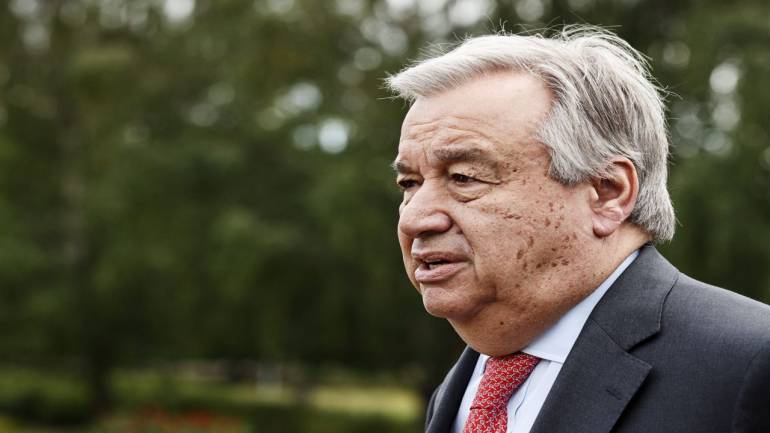
A “peaceful and just solution” to the longstanding Israel-Palestine conflict can only be achieved through creation of two States living side-by-side in peace and security, UN Secretary-General Antonio Guterres has said, asserting that there is no plan B.
In his address to the Committee on the Exercise of the Inalienable Rights of the Palestinian People, which was established by the UN General Assembly in 1975, Guterres said on February 15 that “based on relevant UN resolutions, long-held principles, previous agreements and international law”, Jerusalem should be the capital of both States.
“Unfortunately, over this past year, the situation has not moved in that direction”, he rued, pointing to protests that began along the border fence with Gaza last year that left hundreds dead and thousands wounded by Israeli security forces.
He also cited “security incidents and provocations by Hamas and other militants in Gaza”, including the launching of rockets and incendiary kites that dangerously escalated the situation.
“Thanks to the UN and Egyptian mediation efforts, a major escalation was avoided”, he said, appealing to Hamas authorities in Gaza to “prevent provocations”.
The UN chief said under International Humanitarian Law Israel too has a responsibility to exercise “maximum restraint”, except as a last resort.
Guterres said he regretted Israel’s decision not to renew the mandate of the Temporary International Presence in Hebron, saying “I hope an agreement can be found by the parties to preserve this long-standing and valuable arrangement”.
“Palestinians have endured more than a half-century of occupation and denial of their legitimate right to self-determination” with both sides continuously suffering from “deadly cycles of violence”, the Secretary-General said.
He indicated that leaders bore the responsibility to reverse this negative trajectory and pave the way toward peace, stability and reconciliation.
Guterres praised the Committee for keeping the focus on the ultimate objective of a “peaceful solution with two States coexisting in peace and security” as the only way to achieve the inalienable rights of the Palestinian people.
“As I have said repeatedly, there is no Plan B,” Guterres said.
He underscored that the UN firmly supports Palestinian reconciliation and “the return of the legitimate Palestinian Government to Gaza” as “an integral part of a future Palestinian State”.
Noting that the ongoing humanitarian crisis in Gaza must be immediately addressed, he detailed that some two million Palestinians remained mired in increasing poverty and unemployment, with limited access to adequate health, education, water and electricity, leaving young people with “little prospect of a better future”.
“I urge Israel to lift restrictions on the movement of people and goods, which also hamper the efforts of the United Nations and other humanitarian agencies, without naturally jeopardising legitimate security concerns,” Guterres said.
Lauding the UN Relief and Works Agency for Palestine Refugees in the Near East (UNRWA) for its “critical work” in Gaza, the occupied West Bank and across the region, he called on the international community to “significantly” increase efforts to revitalise Gaza’s economy.
Touching upon the risk of further unrest in the West Bank, the UN chief flagged that Israeli construction and settlement plans have expanded, including in East Jerusalem.
“Settlements are illegal under international law”, he asserted.
“They deepen the sense of mistrust and undermine the two-State solution”.
[“source=moneycontrol”]




